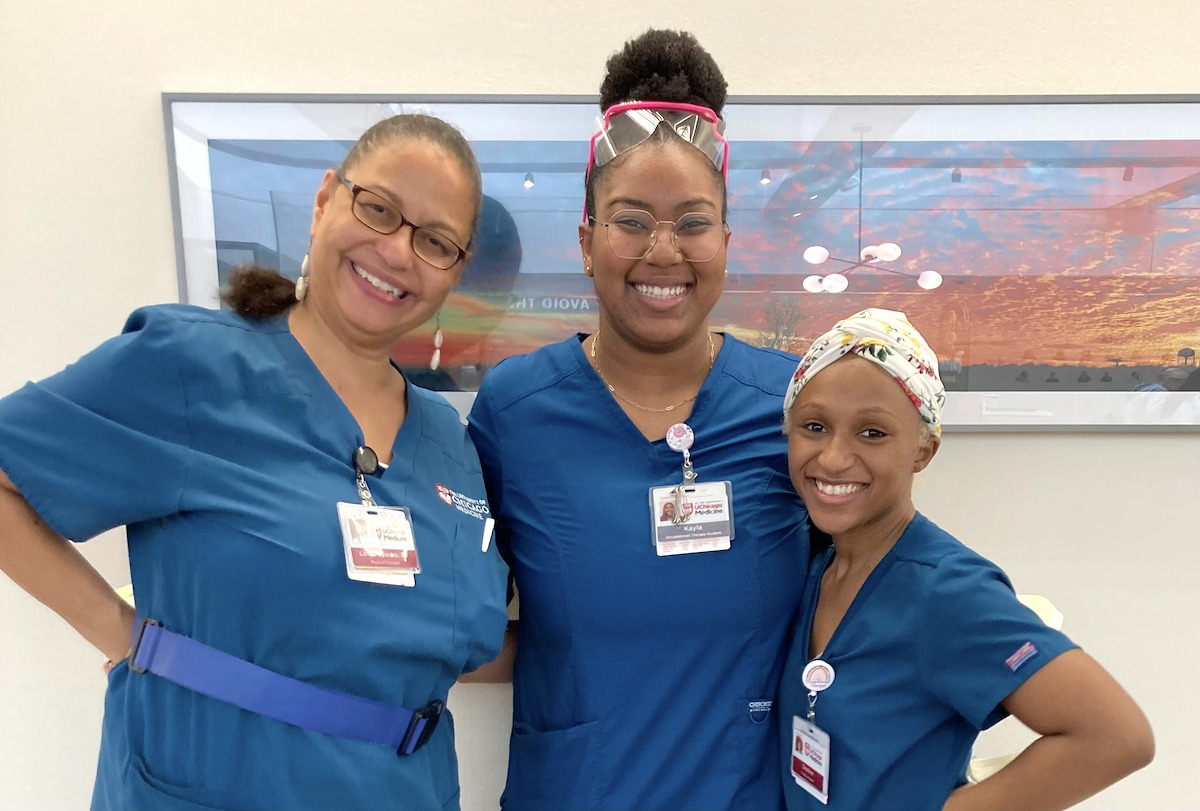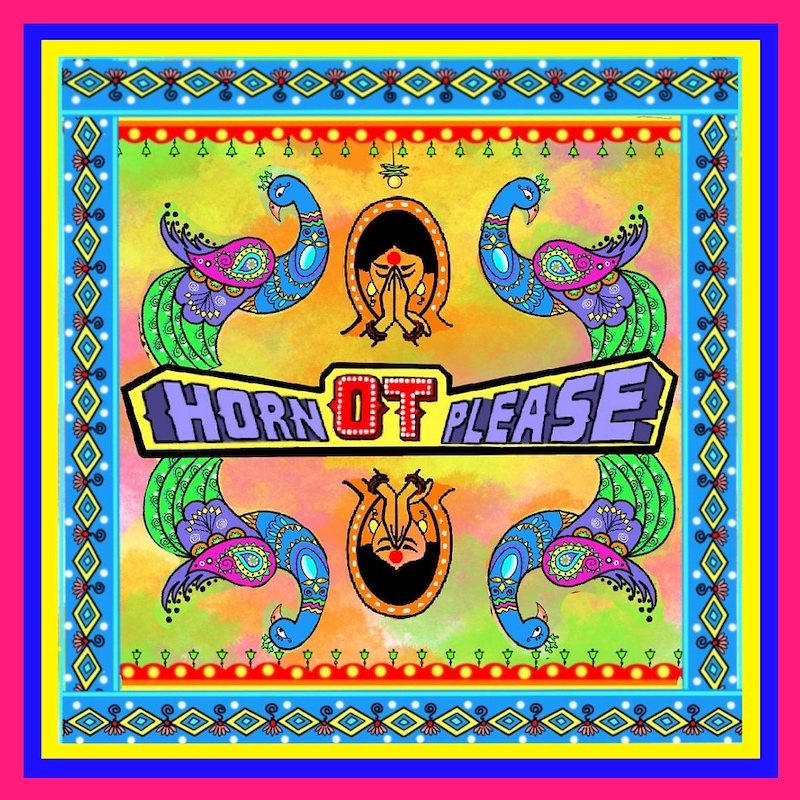Student Blog
Diversity
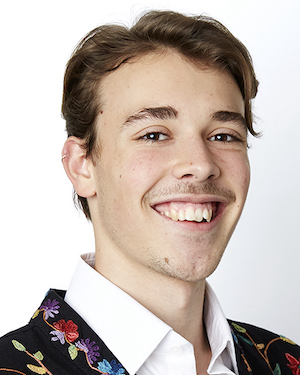
Humans of USC Chan Volume 3 ⟩
April 20, 2022, by Seth
Community Diversity What are OS/OT?
Committing to graduate school is a big decision and exploring which ones may be the best fit for you can be an equally arduous experience. I remember when I was looking into occupational therapy programs, I looked at the standard quality and cost components, but as a queer person, I was also looking for a place and a profession that I felt could let me blossom as I transitioned into a new life stage (i.e., adulthood, a professional, and, let’s be honest, a world outside of the closet). I wanted to know if I could drop my hairpins or if I had to censor myself. I wanted to know if I could bring LGBTQIA+ topics into the classroom without being anxious about how they would be received. Would I feel isolated or could I find a community? My community? What are my classmates’ experiences, and what can I learn from them? These questions can be hard to find and directly seeking them out can be intimidating or a moment of self-disclosure that may not feel right yet. After all, it’s not often you see these experiences plastered on a program’s website. So, I took it upon myself to do just that.
I hosted a forum with some LGBTQIA+ students within the Chan Division to talk about how they discovered occupational therapy, their relationship with the profession, and their experiences navigating an occupational therapy program. This is a video curated by a queer person in partnership with queer people. And this one is for the family! We even share some advice for those thinking of applying to a program. If you choose to watch it through YouTube, the video is time-stamped with each topic if you ever want to go back to a specific conversation.
I hope you find this video helpful and that these diverse perspectives give you more insight into what LGBTQIA+ student life is like in the Chan Division! Welcome back to the Humans of USC Chan!
⋯
Ramadan Mubarak ⟩
April 13, 2022, by Global Initiatives Team
Diversity
By Vanessa ElShamy, Entry-Level Professional Master’s student
Editors Michelle Plevack and Abraham Ramirez
Entry-Level Professional Master’s students
Ramadan — the ninth month of the Islamic calendar. In short, this is the month where Muslims believe that the Qur’an (our holy book) was revealed to the Prophet Muhammad. Most people know that Muslims fast during this month (no food or drink from sunrise to sunset, and yes, not even water), however, it goes much deeper than that. Muslims do not just fast from food and drink, we also fast from poor habits such as bad mouthing others and seek stronger spirituality and connection to God (Allah), pray heavily, read the Qur’an more often, and participate in profound self-reflection. Additionally, we are obligated to give to charity (zakat) and perform good deeds as often as possible — selfishness has no place in Ramadan. While individuals may approach Ramadan slightly differently around the world, it is understood that the main objective is not to make ourselves suffer, but to become more conscious of our beliefs and look inward to pursue true self-improvement. When you strip your life of worldly pleasures, you are only left with yourself. It may seem intense to some, but I truly feel that it cleanses my heart.
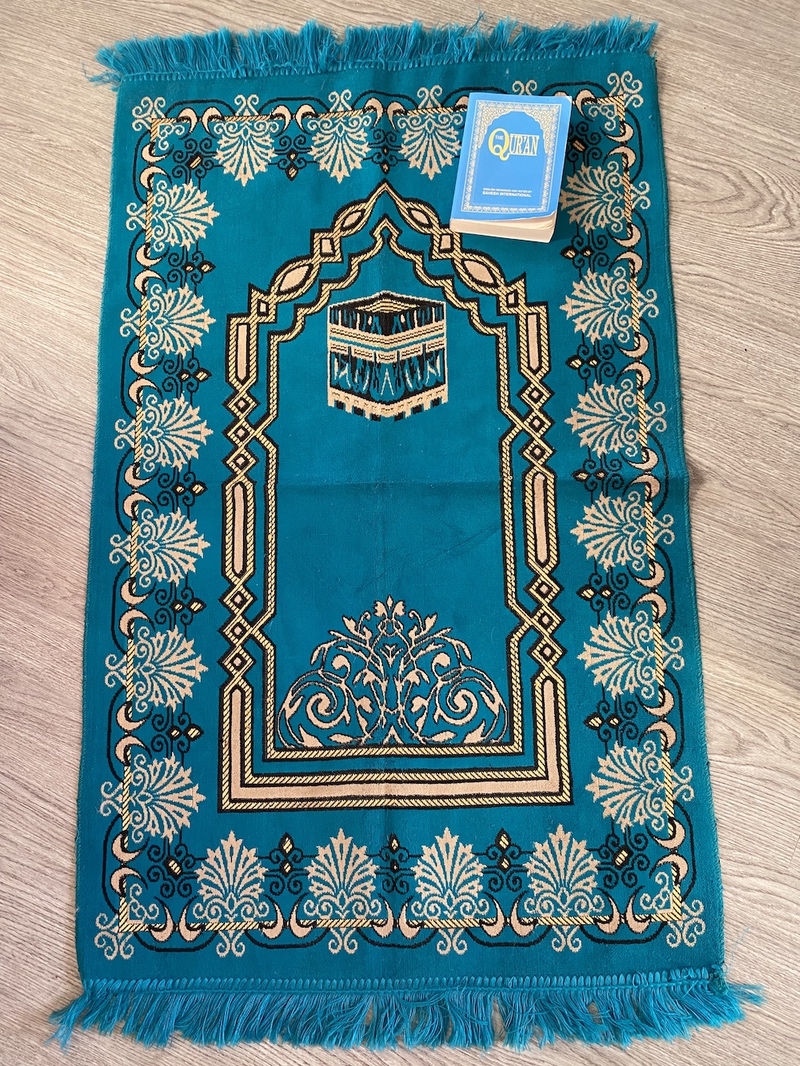
My prayer mat and Qur’an. We always face our mats and bodies toward the Kaaba, the sacred center of the holy city of Mecca.
Ramadan is based on the lunar calendar, so it starts on a different date every year. This year it began on April 2nd and will continue until May 2nd. This is the first year that I am observing Ramadan on my own, out of my parents’ house. It is also the first year in a long time that I am fasting during classes and exams, which I will admit, I am not exactly looking forward to. As beautiful and transformative as Ramadan is, it is not easy, and it is not supposed to be. We are 3 days into this year’s fast and so far I am surprised by how capable I have been without my morning coffee. I have not had any headaches from lack of caffeine thus far, and for this I say “Alhamdulillah” (“thank God” or “praise be to God”). While I have been a bit sad because I miss my family and our Ramadan traditions — feeding each other dates before Iftar (the meal that ends the day’s fast), drinking decaf coffee and eating baklava together after dinner, and more — I feel optimistic about what the month will bring me. As humans, we will make mistakes — they are a part of life. I know this to be true but I usually do not give myself the same grace I give others when I make mistakes. Ramadan reminds me time and time again that we are worth forgiving when we make mistakes, as long as we take responsibility for them and commit to doing better. Shame and guilt are powerful forces, but forgiveness is always stronger. Due to this, I have left Ramadan every year with a heightened sense of self-worth and a clearer picture of life’s purpose.
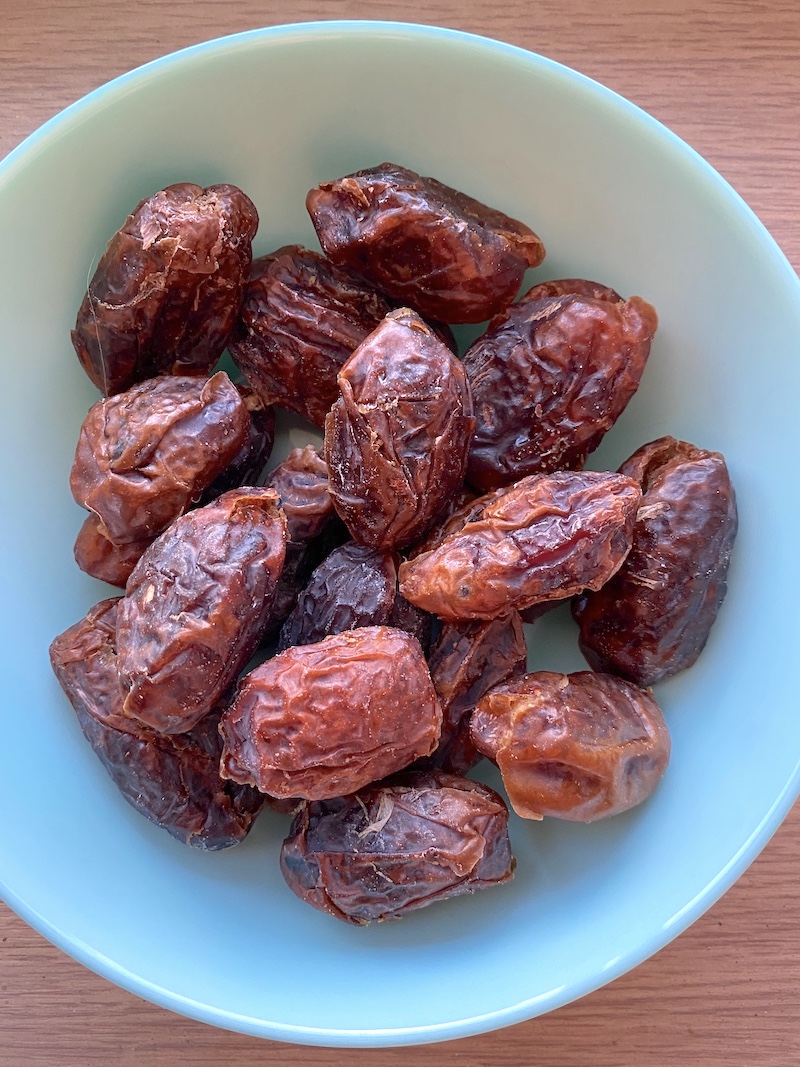
The Mejdool dates that I have been breaking my fasts with this year. Dates are high in sugar and vitamins, which makes them good to eat after a long day of fasting.
Participating in Ramadan is a meaningful occupation to me. During the month, fasting becomes an activity of daily living. When looking at the Occupational Therapy Practice Framework (OTPF), Ramadan encompasses client factors such as personal values, beliefs, and spirituality. While these factors may not be important to all, they are vital to people like me who shape their everyday lives off of certain spiritual sentiments. As the OTPF states, spirituality is “the aspect of humanity that refers to the way individuals seek and express meaning and purpose and the way they experience their connectedness to the moment, to self, to others, to nature, and to the significant or sacred” (AOTA, 2020). I honestly cannot imagine my life without Islam or Ramadan. Every time I waver from the spiritual path, I find myself being pulled back in. Every time I get annoyed that I “have” to fast and pray, I remind myself how beneficial it is for my spirit and mind. I think it is beautiful that so many people feel similarly about different religions and other forms of worship — this was a little glimpse into mine.
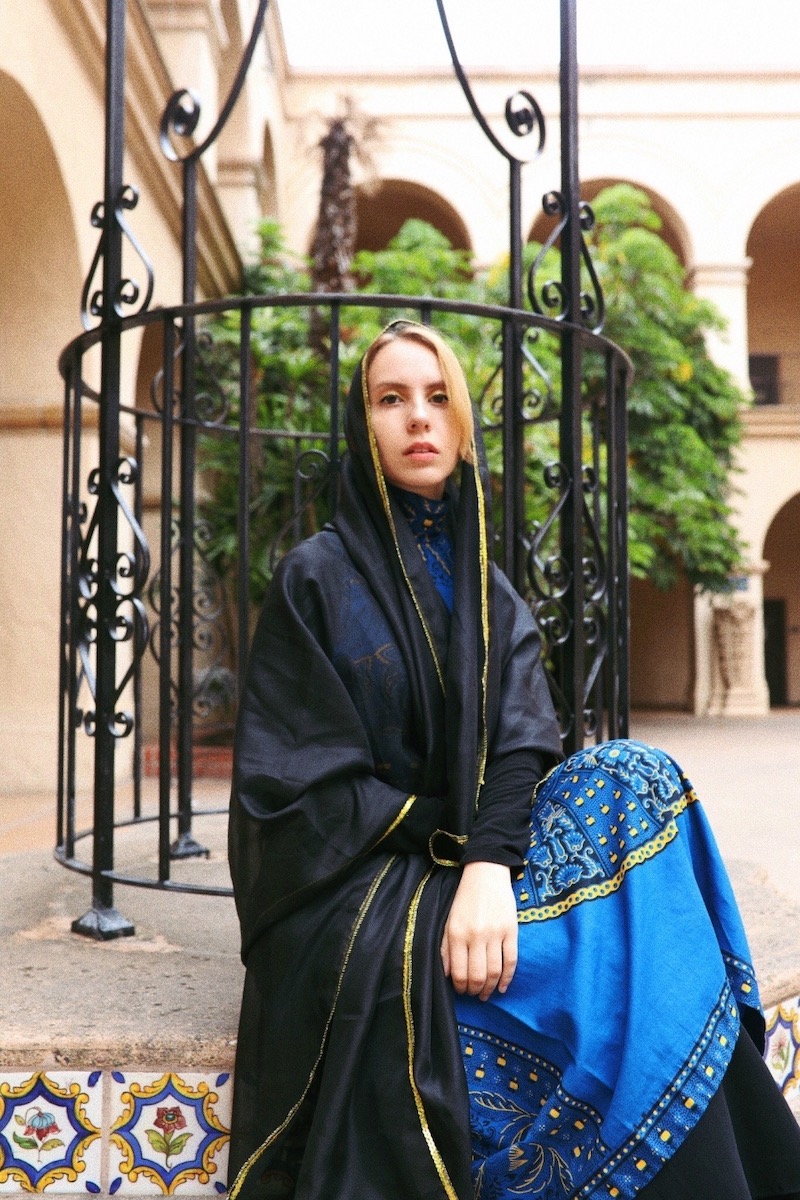
Me, a few years ago on Eid (the celebratory day after Ramadan ends).
⋯
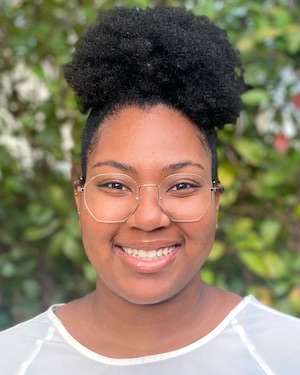
Imposter Syndrome . . . Is That You? ⟩
March 31, 2022, by Kayla
Community Diversity Life Hacks
As a part of my PP-OTD journey, my residency is a year long. In the grand scheme of things that isn’t a long time, but when you’re in the middle of it, you start to feel the time moving by. You have time to think about the past, where you are, and most terrifyingly . . . the future. As I’ve started thinking about my future, for the first time in a long time, there is so much uncertainty. In undergrad I knew, OT school was next. In the MA program, I knew my OTD was next. But now that I’m entering the last 6 months of residency, the next chapter has yet to be written and I’m definitely feeling the pressure.
If I could put words to what I’m experiencing, the definition of imposter syndrome would sum it all up quite nicely. For me, imposter syndrome manifests as the feeling that everyone around me can sense that I’m “faking it until I make it” and is judging me . . . big time. Honestly, this is a new experience for me and it’s been causing a lot of unneeded worry.
For most of my academic career, I was blessed enough to avoid seriously feeling the effects of imposter syndrome. As a student in undergrad or in the MA program, we were all in it together *insert High School Musical here* and it felt like everyone else was just as confused and doing equally as much soul searching as I was. But now, in residency, where I’m working with more experienced practitioners and with other students who have different strengths than me . . . those thoughts are starting to creep in. And as a result, I found that when I make mistakes, as any human does, I start feeling super down on myself and questioning my ability to be a good OT.
After taking some time to sit with my feelings and coming to realize what has been going on, I found that reframing my thoughts and experiences helped sooooo much. Taking the time to validate the work that I’m putting in, acknowledging the growth that I’ve experienced over the past six months, and reassuring myself that I am doing my best and that’s what matters.
Coincidentally, in the midst of feeling all of the feels, I got a text message from one of the senior physical therapists at my residency site to meet up and eat lunch with her and the other OT/PT/PTA students of color! We sat and talked about our unique experiences and it really helped me feel heard, and reassured me that: 1) I was not the only person to ever feel like this, and 2) that by no means do these feelings last forever. You can say that I found my little communOT/PT 😊 This came at the seemingly perfect time; more than anything it was a reminder that that this too, shall pass.
⋯
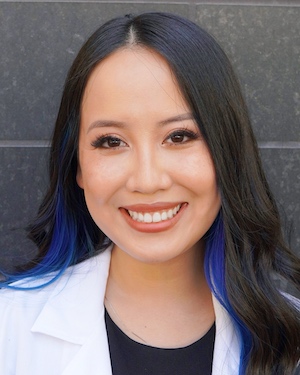
WOMEN ⟩
March 26, 2022, by Teresa
That’s it. That’s the post.
As Women’s History Month comes to an end, I’ve been reflecting on all the women who’ve helped shape me into the woman I am today while I learn how to use my voice for all the women to come. Here are some of them:
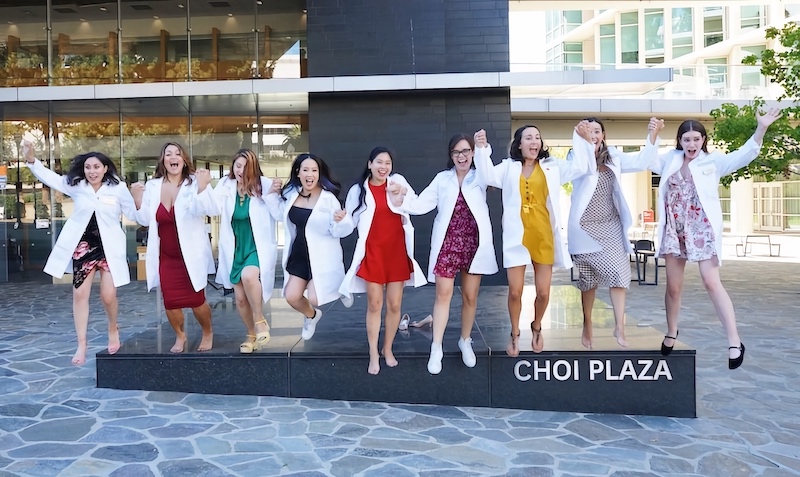
From left to right: Daniela, Michelle, Miranda, myself, Maggie, Denisse, Emily, China, Lizzo
Over 75% of occupational therapists in America are women and I can’t wait to become one of them. To enter a profession filled with such intelligent, warm, compassionate, and beautiful individuals such as the ones pictured alongside me here always reassures me that I followed the right path. Both in and out of the classroom, I learn so much from their strength, resilience, and experiences. With all of us being at Chan at the same time and learning from our professors who are some of the most powerful women I’ve encountered in this profession, we are constantly challenged to grow into our power as well.
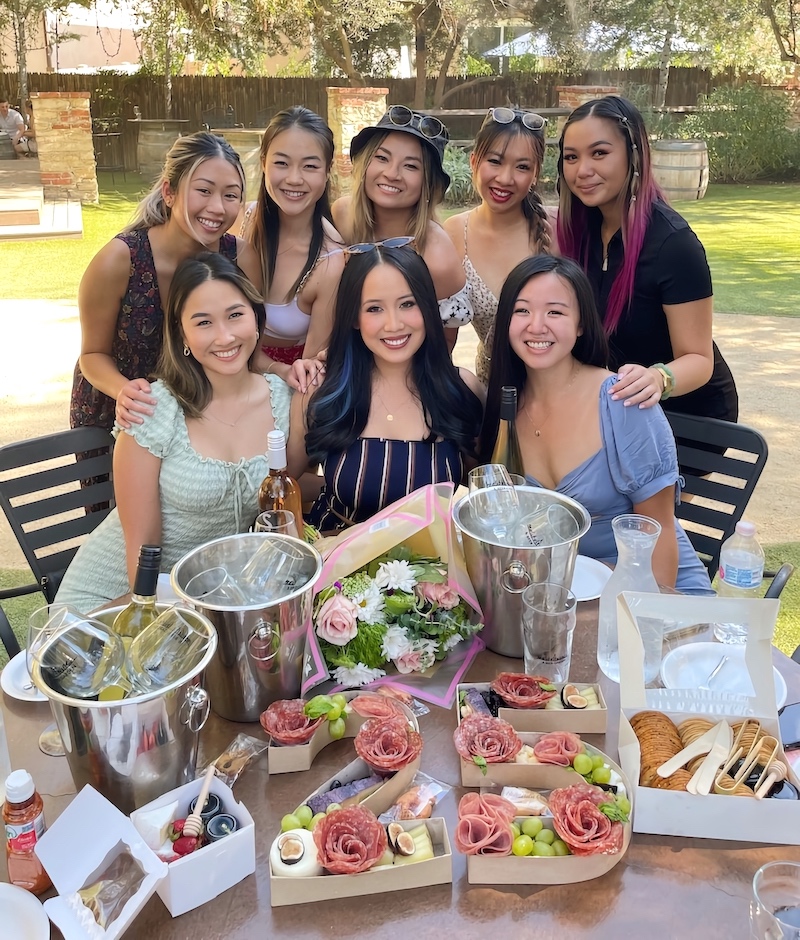
Top row from left to right: Michelle, Yuka, Courtney, Ann, Connie
Bottom row from left to right: Joan, myself, Kristine
From middle school to undergrad, I’ve found lifelong friends along the way and I am so proud of the women we’ve become and are on our way to becoming! It’s extremely empowering to see my friends achieving their goals and doing the things we talked about growing up. I love hearing their stories about their respective fields — marketing, medicine, accounting, nursing, business, social work — and only hope they feel the same whenever I talk about OT. At this point, I’m pretty sure they could give you a pretty good definition of what occupation is 😉 Whether it be moving across the country to start a new job, going to graduate school, or buying a home, I love to see my favorite women succeed. It motivates me to work toward my dreams as well, so that we can all celebrate our wins together. #WomenPostingWs
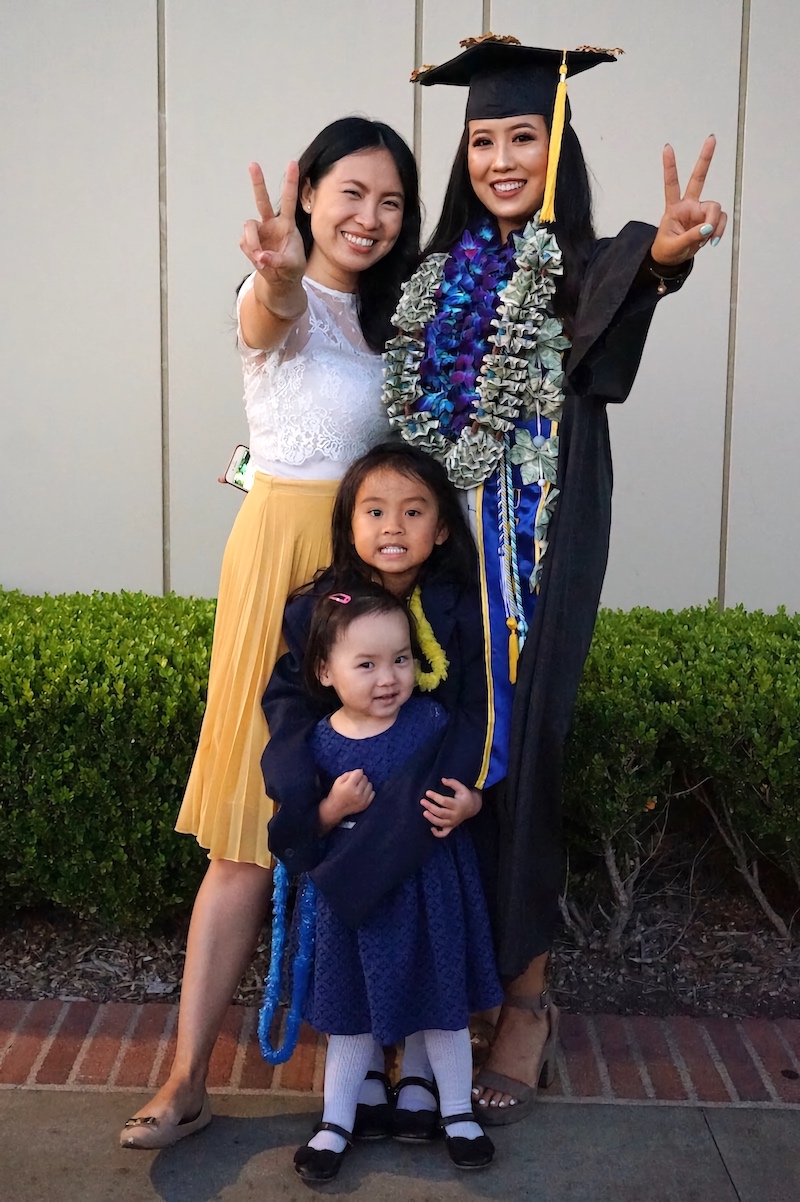
Me, my sister, Kim (USC Price MHA ’16), and our nieces manifesting Fight On ✌️ for me at my graduation from UCLA in 2018
Last but not least, there’s all the women in my family who have played a crucial role in who I am. Coming from a family of refugees and immigrants, obtaining degrees from all these fancy universities sometimes feels . . . snobby, even though it’s the very reason they came here – better opportunities for those who came after, for me. I think about this a lot and even more so once I became an aunt to two beautiful girls. While the strength, resilience, and sacrifices of my grandma, mom, aunts, and sisters have shaped who I am, my nieces help shape the woman I want to become.
When taken together, I am reminded of the complexities of being a woman, the many roles and expectations it comes with (both good and bad), and how this experience becomes further convoluted by things out of one’s control, including gender identity, being BIPOC, and the imposition of traditional gender roles. When I think about my own intersectionality, it is in relation to a new skill — learning how to use my voice to take up space. Growing up, I was told to become the docile, hardworking, obedient Vietnamese girl I was meant to be. As the youngest daughter, my thoughts often came last and my opinions were seldom considered as a serious contributor to the conversation. So as I grew into womanhood, being told that my voice mattered felt unnatural sometimes. It can still be difficult to organize my thoughts and convey them as a seamlessly delivered statement, without anticipating being silenced. I still haven’t figured out the surefire way to rectify this, but I do know how empowering it is when I use my voice and have folks right there alongside me, listening and lifting. I’d like to leave you with a poem I admire; it is my hope you use it to uplift the voices of all the women in your life, this month and every month until the end of time.
Hear me as a woman.
Have me as your sister.
On purpled battlefield breaking day,
So I might say our victory is just beginning,
See me as change,
Say I am movement,
That I am the year
And I am the era
Of the women.
“Won’t You Be My Sister?”
by Amanda Gorman
⋯
A spicy podcast from the land of spices! ⟩
March 1, 2022, by Global Initiatives Team
Diversity International
By Prutha Satpute, OTD USC alumni; Cohost and editor of HOTP
By Sakshi Tickoo, BOTh, Personal Counselor; Cohost and PR head of HOTP
By Varada Pisharody, MsOT, OTR/L; Cohost and CEO of HOTP
Editors Brittany Inouye and Abraham Ramirez
Entry-Level Professional Master’s students
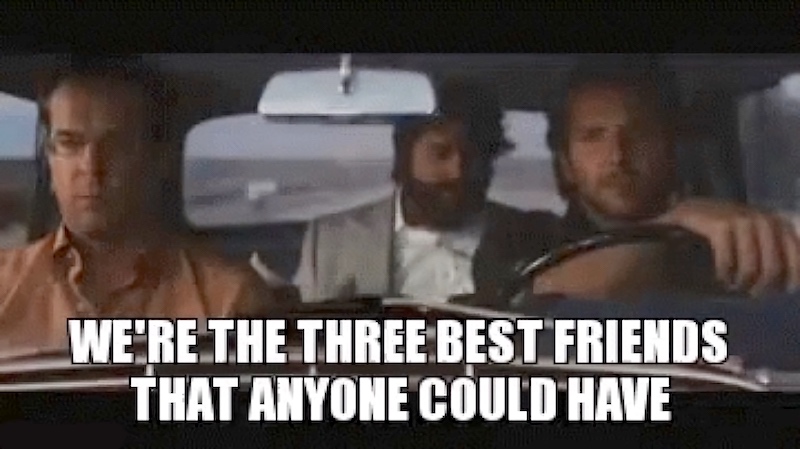
Who are we?
We’re the three best friends
that anybody could have
We’re the three best friends
that anybody could have
And we’ll never ever ever ever
leave each other!
We are three OTs from India, who are at different phases in our (professional) lives, with three completely different personalities, living in 3 different time zones (east coast, west coast, and India). Regardless of these differences we have one thing in common — our love for each other and what we do.
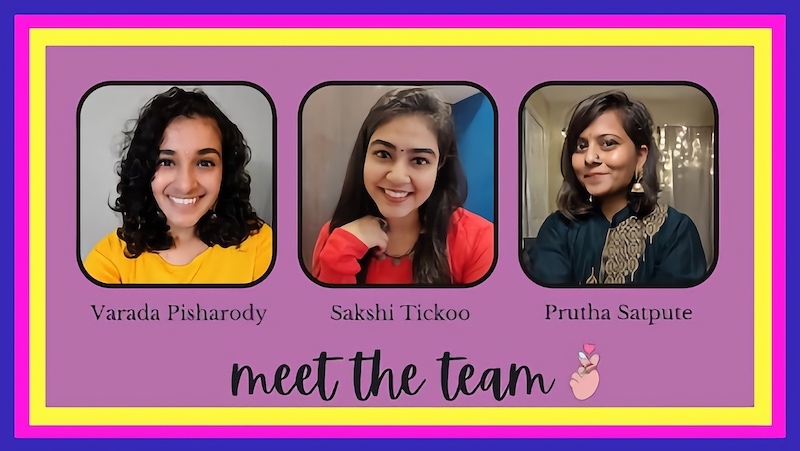
We decked up for a long-distance photoshoot for the launch of the podcast. For more details on who we are check out our website: hornotplease.com
What do we do?
Well, throughout our Bachelor degree years we found ourselves within the grasp of knowing what OT was but never really being able to pinpoint how the core values and fundamentals of our profession related to the everyday lives of people. At the same time, when we would watch Netflix shows or social media trends, we would find these amazing links back to the things we were learning in our textbooks about environmental context and human behavior. The more evidence we found of such links, the more we felt the need to create a platform that would appeal to the minds of OTs who were tired of their mid 20th century Western world-view textbooks. So, in June 2021, we founded Horn OT Please — a student friendly podcast that uses Occupational Science as its backbone to understand OT practices, values, and principles with the help of modern-day educational perspectives. Horn OT Please ended up being the first ever Indian OT podcast available on all listener platforms; this was not only special but it added to the sense of value and responsibility for the work we are doing. So, every week despite our busy schedules and unkind time zone differences (I complain because I wake up at 7am on a Saturday!) we hop on Zoom to study, research, and record our sessions. We try to cover a wide range of topics like:
- Student life
- Ups-downs, perks-disappointments, joys, and wonders of being an OT
- What is OT education like in India and other countries?
- OT Education
- Reforms in OT books and teaching methods
- OT soft skills
- Prepping for the big scary world
- OT Practice
- Non-traditional settings, areas of practice, and interventions
- Personal anecdotes
How do we do it?
Simply reading words on paper did not challenge us to think critically in a client-specific scenario. On the other hand, watching the Oscar winning movie ‘The Father’ gave a visual, auditory, cognitive, mental, and emotional character to the signs and symptoms of Alzheimer’s, making it more real and relatable. We are constantly in search of narratives and stories fictional/non-fictional that can act as a medium for learning and understanding OT concepts. We use scientific manuscripts, journal articles, movies, documentaries, history, art, trends on Instagram, TikTok, and other non-traditional media to blur the line between academic and non-academic learning materials.
Why do we do it?
Because we can. For a long time we waited for OT professionals who could answer our questions and make sense of our fanatical ideas. As the three of us have started diverging into different practice areas and settings, our inquisitiveness has only led to more questions that remain unanswered. Horn OT Please is our safe haven. And we hope that it becomes a space where disparate worlds of thought can come together; challenging OTs globally to think outside the box, and further advance our profession.
If you have any questions or would like to know more you can reach us through our socials — email: .(JavaScript must be enabled to view this email address), Instagram: @hornotplease, website: hornotplease.com.
⋯






